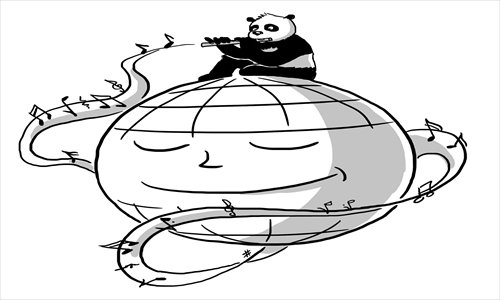Musical success sign of new cultural era

Even during the Chinese New Year when major performance venues in New York were packed with celebration concerts and galas, the one that took place in Lincoln Center last Saturday still stood out.
Twenty-six professional singers presented popular Chinese songs from different eras from "Ode to the Yellow River" to "The Moon Represents My Heart."
The audience was enthusiastic, but what really made the concert impressive was that the singers, from seven countries, didn't speak Chinese.
They were selected in auditions and trained in China for a few weeks as part of the annual "I Sing Beijing" program initiated by The Metropolitan Opera singer Hao Jiang Tian, and funded partly by Hanban of the Chinese Ministry of Education.
When talking about the idea to local media here in New York, Beijing native Tian recalled his own ordeal of learning to sing in foreign languages in the 30 years since coming to the US.
"It is time for Westerners to sing in Chinese," he said.
Tian and the singers participating in the concert are certainly not the only ones to think so. In the past two years, singing Chinese songs seems to have become a fashion among Western singers, professionals and amateurs alike.
The Chinese New Year Gala presented by CCTV is one barometer of this.
Many were awed by Celine Dion's Chinese language debut, "Jasmine Flower," sung together with Chinese folk singer Song Zuying. And at the end, several Westerners participated in the finale song "Cannot Forget Tonight."
The Internet might be a better place to discover more. Just search "foreigners singing Chinese songs" on YouTube or its Chinese counterpart Youku, and you'd be amazed by the number of results. Some of these are so good that they went viral on the Internet right after they were posted.
Examples include: "Under a Vast Sky," a song by Hong Kong rock band Beyond, retouched by US vocal group Metro in Cantonese; "What Are You Looking For," written and sung by US singer Christine Welch in Mandarin in a style reminiscent of Taiwan pop star Jay Chou; And the hip-hop adaptation of the revolutionary song "Azalea Flowers" by US duet Martin & Antoine, which all enjoy 1 million or so views online.
Sometimes, you don't even have to search. When my friends living in London were passed by a Western cyclist on the street recently, they clearly caught the lyrics he was humming - the Hong Kong pop song "Understand My Heart."
Given the worldwide wave of interest in the Chinese language, these may sound like insignificant byproducts.
A friend teaching in a Confucius Institute in the US likes to boast that her US students can read the poems of Tang Dynasty (618-907) poet Li Shangyin, printed in the ancient vertical line style.
But what makes the singing trend worth noting is that the singers are not all students learning Chinese. They were just moved by the melody, and some cannot speak much more Chinese than the lyrics of the song.
This reminds me of the 1980s when young people in China first heard Chinese singers singing English songs.
Many of my generation still remembered the thrill when we first heard "Where do I begin? To tell the story of how great a love can be…" (from the theme song from Love Story) from guitarist and singer Cheng Fangyuan.
Many of us were not studying English or thinking of coming to the US then. We didn't even know what the lyrics were about. We were simply entranced by the music.
Yet, it may not be a coincidence that we started to drink Coca-Cola and wear jeans at the same time.
Some see language study as the major measurement of a culture's popularity. But this is just part of the picture.
The number of people studying a certain language can be boosted by launching mandatory classes, pressure from tiger parents or practical demand from those seeking to profit from a growing market.
Music is different. It is a language without boundaries. But it's not easy for the music from one culture to be engaging enough to reach and then appeal to foreign ears that were not seeking it out.
And when it does, it is often an unmistakable sign of a new era.
The author is a New York-based journalist. rong_xiaoqing@ hotmail.com